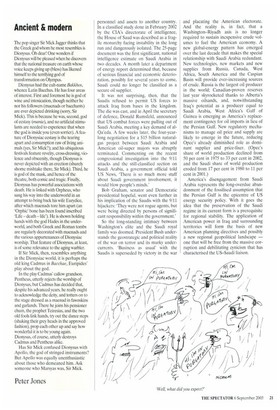Ancient & modern
The pop singer Sir Mick Jagger thinks that the Greek god whom he most resembles is Dionysus. Oh dear? One wonders if Dionysus will be pleased when he discovers that the national treasure on earth whose voice keeps giving up (bless) has likened himself to the terrifying god of transformation on Olympus.
Dionysus had the cult-name Bakkhos, whence Latin Bacchus. He has four areas of interest. First and foremost he is god of wine and intoxication, though neither he nor his followers (maenads or bacchants) are ever depicted drinking (sorry, Sir Mick), This is because he was, second, god of ecstasy (mania), and no artificial stimulants are needed to experience that when the god is inside you (even sorrier). A feature of Dionysiac ecstasy is the tearing apart and consumption raw of living animals (yes, Sir Mick?); and his ubiquitous festivals feature revehy, cross-dressing, violence and obscenity, though Dionysus is never depicted with an erection (shurely shome mishtake there, Sir Mick). Third, he is god of the mask, and hence of the theatre, both comic and tragic. Finally, Dionysus has powerful associations with death. He is linked with Orpheus, who sang his way into the underworld in an attempt to bring back his wife Eurydice, after which maenads tore him apart (an `Orphic' bone has been found inscribed 'Life death -life'). He is shown holding hands with the god Hades in the underworld, and both Greek and Roman tombs are regularly decorated with maenads and the various appurtenances of Dionysiac worship. That feature of Dionysus, at least, is of some relevance to the aging warbler.
If Sir Mick, then, resembles anything in the Dionysiac world, it is perhaps the old king Cadmus in Bacchae, Euripides' play about the god.
In the play Cadmus' callow grandson, Pentheus, utterly rejects the worship of Dionysus, but Cadmus has decided that, despite his advanced years, he really ought to acknowledge the deity, and totters on to the stage dressed as a maenad in fawnskins and garlands. There he joins his pensioner chum, the prophet Teiresias, and the two old fools link hands, tiy out the dance steps (shaking their grey heads in the approved fashion), prop each other up and say how wonderful it is to be young again.
Dionysus, of course, utterly destroys Cadmus and Pentheus alike.
Has Sir Mick confused Dionysus with Apollo, the god of stringed instruments? But Apollo was equally unenthusiastic about those who demeaned him. Ask someone who Marsyas was, Sir Mick.
Peter Jones










































































 Previous page
Previous page